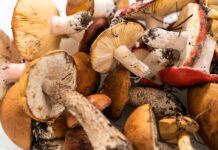
By Sherry J. Chen, ND
Experiencing bad breath, medically known as halitosis, can be both embarrassing and distressing. It’s a common issue that affects many, but the good news is, there are natural ways to tackle it head-on. Understanding the root causes and adopting simple, natural remedies can transform your oral health and confidence.
The Science Behind Bad Breath
Halitosis primarily stems from the bacteria residing in our mouths. These microorganisms interact with food particles, dead cells, and mucus, leading to a chemical reaction that produces sulfurous compounds—similar to the unwelcome odor of rotten eggs.
Diet and Hydration: Your First Line of Defense
A balanced diet plays a crucial role in preventing bad breath. Reducing sugar intake is essential as it can decrease the risk of tooth decay, a common culprit behind halitosis. Incorporating whole grains, raw or lightly cooked fruits, and vegetables into your meals can enhance digestion and toxin elimination, indirectly improving breath odor.
Vitamin C-rich foods are particularly beneficial. They not only support gum health but also help reduce excess mucus production, a potential cause of bad breath.
Hydration is equally important. Drinking ample water keeps the mouth moist, discouraging the growth of bad-breath-causing bacteria. Adding a splash of lemon to your water can stimulate saliva production, naturally cleansing your mouth.
Beyond Diet: Understanding Other Causes
Medications like antidepressants and antihistamines can lead to a dry mouth, exacerbating bad breath. If you’re experiencing dry mouth due to medication, consulting with a healthcare practitioner for alternative solutions is advisable. Conditions such as diabetes can also cause dry mouth, highlighting the importance of addressing underlying health issues.
Sinusitis, rhinitis, and allergies can contribute to bad breath through post-nasal drip. The mucus accumulating at the back of the throat becomes a breeding ground for bacteria. Identifying and treating allergies can, therefore, play a significant role in eliminating bad breath.
Seeking Professional Help
Halitosis can sometimes signal deeper health concerns involving the digestive, immune, or endocrine systems. Don’t hesitate to seek professional advice. A healthcare practitioner can help identify the root cause of bad breath, offering solutions that address more than just the symptoms.
Conclusion
Bad breath doesn’t have to be a persistent problem. By understanding its causes and embracing natural remedies, you can enjoy fresh breath and improved oral health. Remember, a holistic approach—combining diet, hydration, and professional advice—can make all the difference.











